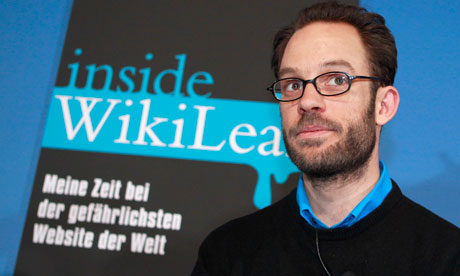
WikiLeaks is threatening to take legal action against a former employee whose book chronicling his time with the organisation characterises its founder, Julian Assange, as obsessed by power and money and with a fondness for young women.
A statement from WikiLeaks said it was taking unspecified action against Daniel Domscheit-Berg, a German national who was once Assange's closest collaborator, after extracts of his book were printed on another site.
Kristinn Hrafnsson, a spokeswoman for WikiLeaks, told the Forbes website that Domscheit-Berg confessed in his book to sabotaging the organisation's submission system for new leaks and that he had been suspended from his duties last September.
In a response to Forbes, Domscheit-Berg denied sabotage and ridiculed the legal threat, saying he had received a letter from a lawyer representing Assange "written in the worst German I ever read", which failed to mention a single law he might have broken. Assange's latest falling out with former collaborators – among them the Guardian – will focus attention on accusations he runs WikiLeaks as a personal fiefdom, something alleged in the book by Domscheit-Berg, who has now helped to set up OpenLeaks.org, a rival whistleblowing site.
The extracts from a forthcoming English edition of Inside WikiLeaks: My Time with Julian Assange at the World's Most Dangerous Website, say that Domscheit-Berg and other WikiLeaks malcontents took control of the main system used to accept leaked materials, deliberately keeping these out of Assange's hands as they feared he could not be trusted to protect sources.
It says: "We were not motivated by revenge. And we did not want to get our own hands on the material, or divert it to OpenLeaks. We just decided to take away these dangerous toys so that Julian could not do harm to anyone else."
This passage, the WikiLeaks spokeswoman said, amounted to a confession of sabotage. His action had necessitated "an overhaul of the entire submission system, an ongoing project that is not being expedited due to its complex nature and the organisation's need to focus its resources on publication and defence".
Domscheit-Berg rejected this in his statement to Forbes. "The overhaul of the system is needed because the owner and developer of that system has decided to no longer allow WikiLeaks to use it, due to the lack of trust in Julian and the way he is 'leading' this organisation, and Julian behaving irresponsibly with source material," he said.
Domscheit-Berg also questioned Assange's attitude to money, saying he and other staff members expressed reservations about charging TV companies a fee to use footage of the "collateral murder" video, showing a US air crew in Iraq targeting civilians and photographers, but were summarily overruled.
Domscheit-Berg claims Assange refused to reimburse the costs of investigators who had travelled to Iraq to do background research on the video.
He also claims that Assange refused to accept other views, writing: "Julian always cut off any discussions between me and the others. 'Do not challenge leadership in times of crisis,' was one of his favourite answers to any critical questions we asked."
The book touches on Assange's alleged philandering, saying he would regularly "boast about how many children he had fathered in various parts of the world", and preferred women "younger than 22".
The WikiLeaks statement did not go into these details but dismissed Domscheit-Berg's role in the group as limited: "He has falsely misrepresented himself in the press as a programmer, computer scientist, security expert, architect, editor, founder, director and spokesman. He is not a founder or co-founder and nor was there any contact with him during the founding years. He did not even have an email address with the organisation until 2008 (we launched in December 2006). He cannot programme and wrote not a single programme for the organisation, at any time."
In his response, Domscheit-Berg denied that he had ever made such claims.
• After this story was published we were contacted by Daniel Domscheit-Berg, who said the extracts of the book come from an unauthorised translation containing errors. In particular he wishes to point out that he did not claim Julian Assange liked women younger than 22, but aged around 22.

